#so HA!
Text
An AMENDED Rundown on the Absolute Chaos That is First Quarto Hamlet
O, gather round me, my dear Shakespeare friends
And let me tell to ye a tale of woe.
It was a dark and drizzly winter night,
When I discovered my life was a lie...
This tale is a tragedy, one of Shakespeare sources turned into gardening websites, "misdated" quartos, and failed internet archives. It is also a story of the quarto itself, an early printing of our beloved Danish Prince's play, including an implied Hamlet/Horatio coffee date, weird and extremely short soliloquies, and Gertrude with a hint of motivation and autonomy.
But let us start from the beginning. Long ago, in the year of our lord 2022, I pulled a Christmas Eve all-nighter to bring you this post: https://www.tumblr.com/withasideofshakespeare/704686395278622720/a-rundown-on-the-absolute-chaos-that-is-first?source=share
It was popularish in Shakespeare circles, which is why I am amending it now! I returned to it tonight, only to discover a few problems with my dates and, more importantly, a mystery in which one of my sources miraculously turned into a link to a gardening website...
Anyhow, let us begin with the quarto!
TL;DR: Multiple versions of Hamlet were printed between 1603 and 1637 (yes, post-folio) with major character and plot differences between them. The first quarto (aka Q1) is best known for its particular brand of chaos with brief soliloquies, an extra-sad Hamlet, some mother-son bonding, weird early modern spelling, and deleted/adapted scenes with major influences on the plot of the play!
A long rundown is included below the cut, including new and improved sources, lore, direct quotes, and my own interpretations. Skip what bores you!
And continue... if thou darest!
What is the First Quarto? Actually, what is a quarto?
Excellent questions, brave Hamlet fan!
A quarto is a pamphlet created by printing something onto a large sheet of paper and then folding it to get a smaller pamphlet with more pages per big sheet (1).
First Quarto Hamlet was published in 1603 and then promptly lost for an entire two centuries until it was rediscovered in 1823 in the library of Sir Henry Bunbury. Rather than printed from a manuscript of Shakespeare, Q1 seems like it may be a memorial reconstruction of the play by the actor who played Marcellus (imagine being in a movie, memorizing the script to the best of your ability, writing it down, and then selling "your" script off to the print shop), but scholars are still out on this (2).
Are you saying that Hamlet comes with the stageplay equivalent of a “deleted scenes and extra credits” movie disc?
Yep, pretty much! In fact, there are even more of these! Q2 was printed in 1604 and it seems to have made use of Shakespeare's own drafts, and rather than being pirated like Q1, it was probably printed more or less with permission. Three more subsequent quartos were published between 1611 and 1637, but they share much in common with Q2.
The First Folio (F1) was published in 1623 and its copy of Hamlet was either based on another (possibly cleaner but likely farther removed from Shakespeare's own text) playhouse manuscript (2, 3). It was an early "collected works" of sorts--although missing a few plays that we now consider canon--and is the main source used today for many of the plays!
The versions of the play that we read usually include elements from both Q2 and F1.
So... Q1? How is it any different from the version we all know (and love, of course)? What do the differences mean for the plot?
We’ll start with minor differences and build up to the big ones.
Names and spellings
Most of the versions of Shakespeare's plays that we read today have updated spellings in modern English, but a true facsimile (a near-exact reprint of a text) maintains the early modern English spellings found in the original text.
For example, here is the second line of the play transcribed from F1:
Francisco: Nay answer me: stand and vnfold your selfe.
For the most part, however, the names of the characters in these later versions (ex: F1) are spelled more or less how we would spell them today. This is not so in Q1.
Laertes is “Leartes”, Ophelia is “Ofelia”, Gertrude is “Gertred” (or sometimes “Gerterd”), Rosencrantz is “Rossencraft”, Guildenstern is “Gilderstone”, and my favorite, Polonius gets a completely different name: Corambis.
(This goes on for minor characters, too. Sentinel Barnardo is “Bernardo”, Prince Fortinbras of Norway is “Fortenbrasse”, Voltemand and Cornelius--the Danish ambassadors to Norway--are “Voltemar” and “Cornelia” (genderbent Cornelius?), Osric doesn’t even get a name- he is called “the Bragart Gentleman”, the Gravediggers are called clowns, and Reynaldo (Polonius’s spy) gets a whole different name--“Montano”.)
2. Stage directions
Some of Q1's stage directions are more detailed and some are simply non-existent. For instance, when Ophelia enters singing, the direction is:
Enter Ofelia playing on a Lute, and her haire downe singing.
But when Horatio is called to assist Hamlet in spying on Claudius during the play, he has no direction to enter, instead opting to just appear magically on stage. Hamlet also doesn't even say his name, so apparently his Hamlet sense was tingling?
3. Act 3 scene reordering
Claudius and Polonius go through with the plan to have Ophelia break up with Hamlet immediately after they make it (typically, the plan is made in early II.ii and gone through with in III.i, with the players showing up and reciting Hecuba between the two events). In this version, the player scene (and Hamlet’s conversation with Polonius) happen after ‘to be or not to be’ and ‘get thee to a nunnery.’ I’m not sure if this makes more or less sense. Either way, it has a relatively minimal impact on the story.
4. Shortened lines and straightforwardness
Many lines, especially after Act 1, are significantly shortened, including some of the play's most famous speeches.
Laertes’ usually long-winded I.iii lecture on love to Ophelia is shortened to just ten lines (as opposed to the typical 40+). Polonius (er... Corambis) is still annoying and incapable of brevity, but less so than usual. His lecture on love is also cut significantly!
Hamlet’s usual assailing of Danish drinking customs (I.iv) is cut off by the ghost’s arrival. He’s still the most talkative character, but his lines are almost entirely different in some monologues, including ‘to be or not to be’! In other spots, however, (ex: get thee to a nunnery!) the lines are near-identical. There doesn’t seem to be much rhyme or reason to where things diverge linguistically, except that when Marcellus speaks, his lines are always correct. Hm...
5. The BIG differences: Gertrude’s promise to aid Hamlet in taking revenge
Act 3, scene 4 goes about the same as usual with one major difference: Hamlet finishes off not with his usual declaration that he’s to be sent for England but with an absolutely heart-wrenching callback to act 1, in which he echoes the ghost’s lines and pleads his mother to aid him in revenge. And she agrees. Here is that scene:
Note that "U"s are sometimes "V"s and there are lots of extra "E"s!
Queene Alas, it is the weakenesse of thy braine,
Which makes thy tongue to blazon thy hearts griefe:
But as I haue a soule, I sweare by heauen,
I neuer knew of this most horride murder:
But Hamlet, this is onely fantasie,
And for my loue forget these idle fits.
Ham. Idle, no mother, my pulse doth beate like yours,
It is not madnesse that possesseth Hamlet.
O mother, if euer you did my deare father loue,
Forbeare the adulterous bed to night,
And win your selfe by little as you may,
In time it may be you wil lothe him quite:
And mother, but assist mee in reuenge,
And in his death your infamy shall die.
Queene Hamlet, I vow by that maiesty,
That knowes our thoughts, and lookes into our hearts,
I will conceale, consent, and doe my best,
What stratagem soe're thou shalt deuise.
Ham. It is enough, mother good night:
Come sir, I'le prouide for you a graue,
Who was in life a foolish prating knaue.
Exit Hamlet with [Corambis/Polonius'] dead body.
(Internet Shakespeare, Source #4)
Despite having seemingly major consequences for the plot, this is never discussed again. Gertrude tells Claudius in the next scene that it was Hamlet who killed Polonius (Corambis, whatever!), seemingly betraying her promise.
However, Gertrude’s admission of Hamlet’s guilt (and thus, betrayal) could come down to the circumstance she finds herself in as the next scene begins. There is no stage direction denoting her exit, so the entrance of Claudius in scene 5 may be into her room, where he would find her beside a puddle of blood, evidence of the murder. There’s no talking your way out of that one…
6. The BIGGEST difference: The added scene
After Act 4, Scene 6, (but before 4.7) comes this scene, in which Horatio informs Gertrude that Hamlet was to be executed in England but escaped:
Enter Horatio and the Queene.
Hor. Madame, your sonne is safe arriv'de in Denmarke,
This letter I euen now receiv'd of him,
Whereas he writes how he escap't the danger,
And subtle treason that the king had plotted,
Being crossed by the contention of the windes,
He found the Packet sent to the king of England,
Wherein he saw himselfe betray'd to death,
As at his next conuersion with your grace,
He will relate the circumstance at full.
Queene Then I perceiue there's treason in his lookes
That seem'd to sugar o're his villanie:
But I will soothe and please him for a time,
For murderous mindes are alwayes jealous,
But know not you Horatio where he is?
Hor. Yes Madame, and he hath appoynted me
To meete him on the east side of the Cittie
To morrow morning.
Queene O faile not, good Horatio, and withall, commend me
A mothers care to him, bid him a while
Be wary of his presence, lest that he
Faile in that he goes about.
Hor. Madam, neuer make doubt of that:
I thinke by this the news be come to court:
He is arriv'de, obserue the king, and you shall
Quickely finde, Hamlet being here,
Things fell not to his minde.
Queene But what became of Gilderstone and Rossencraft?
Hor. He being set ashore, they went for England,
And in the Packet there writ down that doome
To be perform'd on them poynted for him:
And by great chance he had his fathers Seale,
So all was done without discouerie.
Queene Thankes be to heauen for blessing of the prince,
Horatio once againe I take my leaue,
With thowsand mothers blessings to my sonne.
Horat. Madam adue.
(Internet Shakespeare, Source #4)
First of all, the implication of Hamlet and Horatio's little date in the city is adorable ("Yes Madame, and he hath appoynted me / To meete him on the east side of the Cittie / To morrow morning.") It reads like they're going out for coffee!
And perhaps more plot relevant: if Gertrude knows of Claudius’s treachery ("there's treason in his lookes"), her death at the end of the play does not look like much of an accident. She is aware that Claudius killed her husband and is actively trying to kill her son and she still drinks the wine meant for Hamlet!
Now, the moment we’ve all been waiting for! My thoughts! Yippee!
On Gertrude:
WOW! I’m convinced that she is done dirty by F1and Q2! She and Hamlet have a much better relationship (Gertrude genuinely worries about his well-being throughout the play.) She has an actual personality that is tied into her role in the story and as a mother. I love Q1 Gertrude even though in the end, there’s nothing she can do to save Hamlet from being found out in the murder of Polonius and eventually dying in the duel. Her drinking the poisoned wine seems like an act of desperation (or sacrifice? she never asks Hamlet to drink!) rather than an accident.
On the language:
I think Q1′s biggest shortcoming is its comparatively simplistic language, especially in 'to be or not to be,' which is written like this in the quarto:
Ham. To be, or not to be, I there's the point,
To Die, to sleepe, is that all? I all:
No, to sleepe, to dreame, I mary there it goes,
For in that dreame of death, when wee awake,
And borne before an euerlasting Iudge [judge],
From whence no passenger euer retur'nd,
The vndiscouered country, at whose sight
The happy smile, and the accursed damn'd.
But for this, the ioyfull hope of this,
Whol'd beare the scornes and flattery of the world,
Scorned by the right rich, the rich curssed of the poore?
The widow being oppressed, the orphan wrong'd,
The taste of hunger, or a tirants raigne,
And thousand more calamities besides,
To grunt and sweate vnder this weary life,
When that he may his full Quietus make,
With a bare bodkin, who would this indure,
But for a hope of something after death?
Which pusles [puzzles] the braine, and doth confound the sence,
Which makes vs rather beare those euilles we haue,
Than flie to others that we know not of.
I that, O this conscience makes cowardes of vs all,
Lady in thy orizons, be all my sinnes remembred.
(Internet Shakespeare, Source #4)
The verse is actually closer to perfect iambic pentameter (meaning more lines have exactly ten syllables and consist entirely of iambs--"da-DUM") than in the Folio, which includes many 11-syllable lines. The result of this, however, is that Hamlet comes across here as considerably less frantic (those too-long verse lines in F1 make it feel like he is shoving words into too short a time, which is so very on-theme for him) and more... sad. Somehow, Q1 Hamlet manages to deserve a hug even MORE than F1 Hamlet!
Nevertheless, this speech doesn't hit the way it does in later printings and I have to say I prefer the Folio here.
On the ending:
The ending suffers from the same effect ‘to be or not to be’ does--it is simpler and (imo) lacks some of the emotion that F1 emphasizes. Hamlet’s final speech is significantly cut down and Horatio’s last lines aren’t quite so potent--although they’re still sweet!
Horatio. Content your selues, Ile shew to all, the ground,
The first beginning of this Tragedy:
Let there a scaffold be rearde vp in the market place,
And let the State of the world be there:
Where you shall heare such a sad story tolde,
That neuer mortall man could more vnfolde.
(Internet Shakespeare, Source #4)
Horatio generally is a more active character in Q1 Hamlet. This ending suits this characterization. He will tell Hamlet’s story, tragic as it may be. It reminds me a bit of We Raise Our Cups from Hadestown. I appreciate that this isn't a request but a command: put up a stage, I will tell this story.
Closing notes:
After over a year, it was due time this post received an update. My main revisions were in regard to source verification. Somehow, in the last year or so, one of my old sources went from linking to a PDF of Q1 to a garden website (???) and some citations were missing from the get-go as a result of this being an independently researched post that involved pulling an all-nighter on Christmas Eve (but no excuses, we need sources!)
I have also corrected some badly worded commentary implying that the Folio's verse is more iambic pentameter-y (it's not; in fact, Q1 tends to "normalize" its verse to make it fit a typical blank verse scheme better than the Folio's does--the lines actually flow better, typically have exactly ten syllables, and use more iambs than Q1's) as well as that the spelling in the Folio is any more modern than those in Q1 (they're both in early modern English; I was mistakenly reading a modernized Folio and assuming it to be a transcription--nice one, 17-year-old Dianthus!) Additionally, I corrected the line breaks in my verse transcriptions and returned the block quotations to their original early modern English, which feels more authentic to what was actually written. A few other details and notes were added here and there, but the majority of the substance is the same.
Overall, if you still haven't read Q1, you absolutely should! Once you struggle through the spelling for a while, you'll get used to it and it'll be just as easy as modern English! If you'd prefer to just start with the modern English, I have also linked a modern translation below (source 5).
And finally, my sources!
Not up to citation standards but very user-friendly I hope...
1. Oxford English Dictionary
2. Internet Shakespeare, Hamlet, "The Texts", David Bevington (https://internetshakespeare.uvic.ca/doc/Ham_TextIntro/index.html)
3. The Riverside Shakespeare (pub. Houghton Mifflin Company; G.B. Evans, et al.)
4. Internet Shakespeare, First Quarto (facsimile--in early modern English) (https://internetshakespeare.uvic.ca/doc/Ham_Q1/complete/index.html)
5. Internet Shakespeare, First Quarto (modern English) (https://internetshakespeare.uvic.ca/doc/Ham_Q1M/index.html)
And here conclude we our scholarly tale,
Of sources, citation, and Christmastime too,
Go read the First Quarto! And here, I leave you.
#shakespeare#hamlet#first quarto#first quarto hamlet#classic literature#revisions#hey look at me#having some scholarly merit#i have so much left to learn#which is a darn good thing#how else would i spend my evenings?#the worst part about this#is that it all started because i thought a got a date wrong#but it turns out i didn't#so HA!#but then i realized i got everything else wrong so....#corrections it is!
25 notes
·
View notes
Text
“ok you’ve had enough wine.” INCORRECT! I do this shit sober too!
2 notes
·
View notes
Text
@ibelieveinthepowerofstuff is cute and sweet and good. and he's handsome and he has beautiful long eyelashes and a nice butt. so ha
3 notes
·
View notes
Text
ANYWAY
I love having one friend whomst i know I share humor with <3 (the other two just don’t get it 😒/lh)
I made a funny and they’re brave enough to share funny with more people, and it’s nice
And now the funny is a thing that we share
#anyone wanna see the funnies?#this was meant to be posted yesterday#however I could not#but now I can#so HA!#colored rambles#colored tag ramble
1 note
·
View note
Text
I did it again
Mari: this is Gambit. He has cats and loves his wife
Me: he’s perfect
Mari; you haven’t read his comics yet?
Me: not yet
#when has that ever stopped me from latching onto a fictional character#it’s kon all over again#also I have now picked up that one gambit comic I found over the weekend#so ha!#overheard over dinner
4 notes
·
View notes
Note
Hey, guess what?
I'm gonna getcha~
(OK I'm done I promise xP)
You’d better be done, you jerk. 😂😤
#and joke’s on you. you can’t even.#why you ask?#I live miles and miles away 😌😈#so HA!#suck on THAT!#asks#tumblr bestie ✨
2 notes
·
View notes
Text
Hey all, you know how internet searches suck now? When the results are awful, full-of-AI, death-of-the-internet levels of bad?
Start appending date constraints to your searches - "before:2023".
My results have gone from 90% AI bullshit to ~60% usable - which frankly at this point is a huge improvement.
#information death of the internet etc#legit this has been SO SO helpful#shout out to mastodon infosec server for this one#before 2022 we did not really have the AI-content-farms because. the tech did not exist to the public.#and you can knock back the date if need be#obviously this does not FIX the problem but#me.txt
80K notes
·
View notes
Text
Oh…. Well, it’s over for Crunchyroll I guess
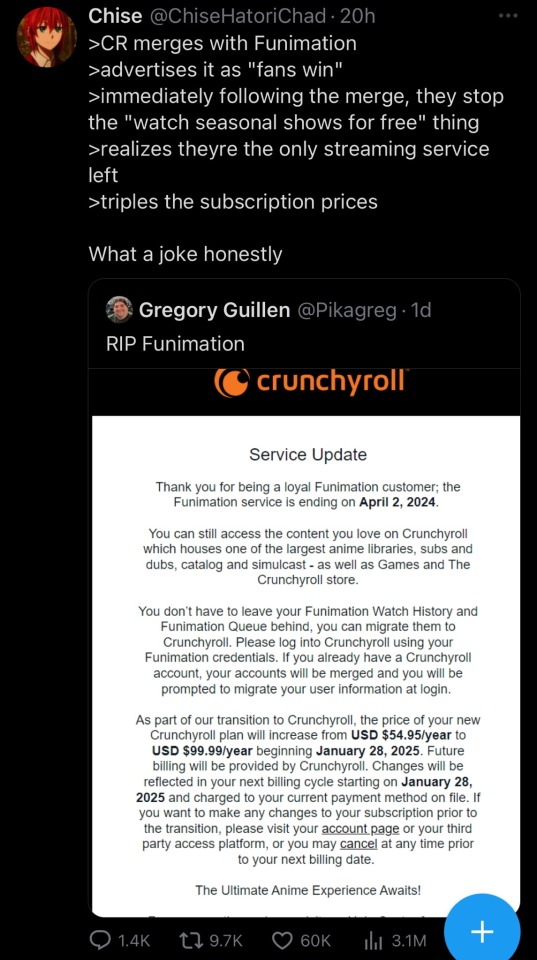
#Crunchyroll#piracy#funimation#money hungry ass streaming service#rambling#I’ve never paid for a streaming service in my life thank god#I appreciated using others accounts but I personally cannot see myself paying this much for a service if I had the funds 😭!#get back to pirating kings!!!#anime has always been one of the easiest forms of media to pirate anyway so y’all got this#CR is definitely not worth paying for though#CR is certainly not worth paying this much for even if it’s a yearly one time fee#capitalism#the fact that CR has always had pretty bad quality as a streaming service anyway#it buffers every time you pause or rewind anything
83K notes
·
View notes
Text
A customer contacted our team with questions, and then finished their email with: "I am daunted by the complexities and unknowns." I haven't been able to stop thinking about it since.
#no wonder the company has to secretly manipulate you#(which is my career tag; it is a quote from a tv show fyi)#(there was some confusion about that! it's from better off ted. just. so you know.)
65K notes
·
View notes
Text
northern hemisphere babes we made it to the longest night of the year. we made it. for the next 6 months, every day will give us a little more daylight than the last. let's go. take my hand. climb out of the darkness with me
87K notes
·
View notes
Text
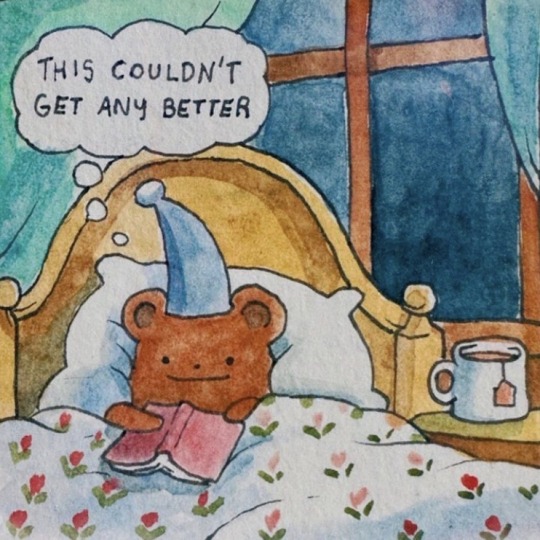
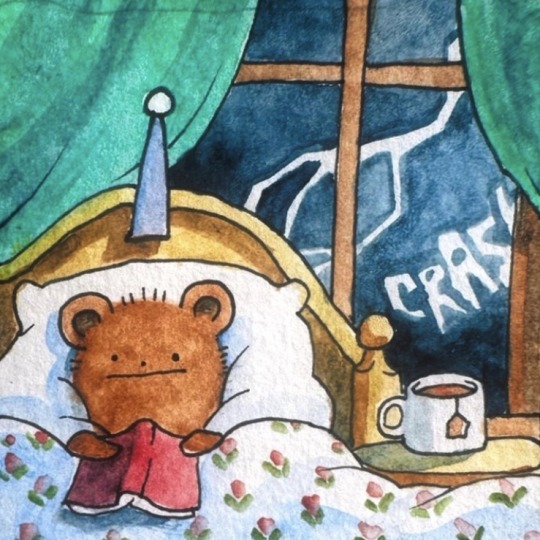
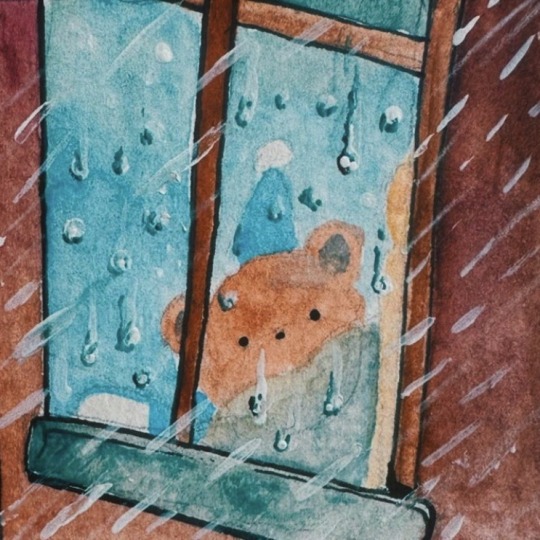
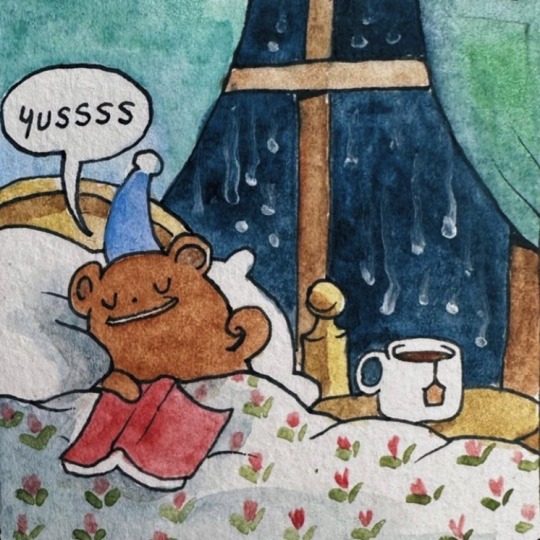
𝖠𝗋𝗍 𝖻𝗒 𝖠𝗇𝗇𝖺-𝖫𝖺𝗎𝗋𝖺 𝖲𝗎𝗅𝗅𝗂𝗏𝖺𝗇 | 𝖨𝖦: 𝖺𝗇𝗇𝖺𝗅𝖺𝗎𝗋𝖺_𝖺𝗋𝗍
#this has to be one of my favorite little comic ever cus YEEEES#I love me a good rain lighting thunder trio <3#ESP while laying in bed with a good book#had to share#cottagecore#comics#art#cute#drawing#rain aesthetic#cozycore#cosycore#reading#comfycore#wholesome#we had MASSIVE rain here today and some lovely lightning & thunder . so this was basically my just switch night to say and bed to couch
123K notes
·
View notes
Text
I don't know who needs to hear this, but
YOU DO NOT NEED TO START A NEW HOBBY!
STEP AWAY FROM THE TEXTILES!
YOU DON'T NEED MORE YARN!
THAT FABRIC IS NOT CALLING TO YOU! LEAVE IT ALONE!
#Mom can you pick me up I'm scared#That siren song is playing again#But wouldn't it be neat to dye spin weave sew knit crochet tat#OMG save me#Hobbies#Textile Arts#Crochet#Knitting#Weaving#Spinning yarn#Cross Stitch#Quilting#Never has Grandma Iris' voice been so loud in my head#(Miss you forever Grandma Iris)
128K notes
·
View notes
Text
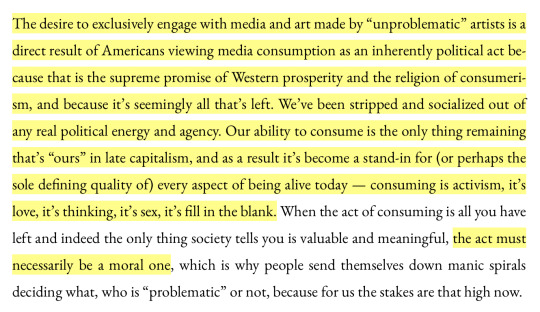
passages that make you whisper "oh my god"
#text!#working on a paper abt the degradation of the line between real/unreal in modern society and this one paragraph blew my MIND#like it literally tied all of my other sources together#also this whole paper is about how sex has disappeared from american media so if ur interested in that i highly recommend it
58K notes
·
View notes
Text
the men and boys are innocent too.
we cry "the innocent women and children" to appeal to the masses, to try and force their sympathy, but the men and boys are innocent too.
I have seen sons crying out for their mothers, their fathers, their siblings. I have seen them break down at the loss of their families. I have seen them cling to their dead and grieve.
I have seen fathers cradle their dead children, seen them kiss their faces and hold their little hands. I have seen them faint with grief when asked to identify the dead. I have seen them carry their sons and daughters. I have seen them fasting to provide what little they can for their families.
I have seen men and boys digging through the rubble with just their bare hands, I have seen them comforting strangers, playing with children, rocking them, hushing them, even if the face of such imminent danger. I have seen them cry, seen them grieve, seen them break down into each other's arms, seen them be selfless, beyond selfless, becoming something I don't have a word for.
I have seen the men who are doctors refuse to leave their patients, even when they have no medicine or supplies to give them, even when they're threatened with bombings. I have seen fathers who have lost all their children pick orphans up into their arms and proclaim them their child so they are not alone. I have seen men and boys digging pets out of the rubble.
the men are innocent too. the men and boys are being hurt and killed too. the men and boys are grieving too. the men and boys are scared too. the men and boys are fighting to save their people too. the men and boys deserve to be fought for too.
#I don't have words to describe how I feel for the men of Palestine#the things I have seen them do after everything they have been through goes so far beyond selfless#what do you call this? this prevailing goodness and willingness to give everything they have and more? what word even touches it?#I don't think there is one#islamophobia has conditioned us to see these men and boys as evil and dangerous#we see this in how we speak about Palestine#and we need to uncondition ourselves#they're just as innocent and of value and good as the women and children#so fight for them#they don't deserve this any more than the women and children#free palestine#palestine
69K notes
·
View notes
Text

You can only reblog this today or until the next Monday, June 19th, 2028.
#he's so old#Garfield#cats#meme#important#this has been scheduled for a year now#posting this a day early so everyone can see it in time#edited bc i fucked up the year
127K notes
·
View notes
Text
Important rules/tips I've learned as an adult that helped with anxiety
If people are mad at you, it's their responsibility to tell you, not your responsibility to guess
If they're mad at you in secret anyways, they're the ones in the wrong, not you
If people don't like what you're doing, it's their responsibility to tell you
If they say it's fine when it's really not, they're the ones in the wrong, not you
People are allowed to be wrong about you
If they are wrong about you, wait for them to bring it up, because if you try to, you will inevitably overcorrect
Some people are committed to misunderstanding you. You will not win arguments against them. Yes, even if you explain your point of view. They do not care. Drop it
The worst thing that will happen from a first-time offense is being told not to do it again. Maybe with a replacement if you broke something
You can improve relationships and gauge willingness to talk to you by giving compliments. It's like a daily log-in bonus and nobody thinks twice about it
Most things are better after you sleep on them
Most things are better after you have a meal
Most things are better after you shower
Your brain makes up consequences that are irrational. If the worst DOES come to pass and someone acts like they do in your head, they are overreacting, and you are entitled to say "what the fuck"
If your chest hurts after you feel like you've made a social error, that's called rejection-sensitive dysphoria. It means your anxiety is so bad that it's causing you physical pain, which is a good indicator that you're overreacting. Tense yourself, hold it for 20 seconds, let it go, then find a distraction
If you're suddenly angry at someone after you feel like you made a social error, that's also rejection-sensitive dysphoria. You are going to feel annoyed about it for awhile, but being genuinely pissed off is your anxiety trying to find something to blame to take the responsibility off your shoulders, and getting scared because it can't justify itself. Deep breaths, ask yourself how much you ACTUALLY want to be angry at that person, then find a distraction
"Sour grapes" is more healthy for you than stewing. Deciding you don't like someone who's perpetually annoyed with you, won't talk to you, etc. makes letting go of anxiety over them easier
If people don't like you, they will find reasons to be annoyed with you when they otherwise wouldn't. If people do like you, they will find reasons NOT to be annoyed with you when they otherwise would. People do not ping-pong between the two
You DO have to make a conscious choice not to think about something. If you're having trouble circling back to it, say out loud that you're done thinking about it and why. Then find a distraction
When you're upset, part of you is going to want to make false bids for attention (suddenly texting differently, heavy sighs, etc. but when someone asks you about it, you tell them it's nothing). Do not listen to it. You gain nothing from it except more misery
People like to help people they care about. It makes them feel good about themselves
If you think you're insufferable for needing help, see above. Yes, really. They get a serotonin kick from it
If you think you're insufferable for mannerisms you have, you either have to consciously choose not to do them, or accept that they're part of the package that comes with you. Being apologetic about existing does nothing except make you more miserable
If you do things you don't like when you feel meh about it, it makes it easier to do them when you hate it
If you avoid things you don't like when you feel meh about it, it reinforces and magnifies how bad it feels when you hate it
Seriously. Read those last two points again. If you can make yourself make a phone call when you've got nothing to lose, you will slowly lose that panic you get when you have to make a phone call you haven't prepared for. You do have to CONSCIOUSLY take that step
Hobbies that make you care for something get rid of that nagging feeling that you're not doing enough. Go grow some rosemary
If you don't engage with your hobbies regularly, you will feel miserable, and anxiety will spike
Hobbies are things that give you a bit of happiness. They do not have to be organized or named to do that. Go be creative in something. Play with coins. Make up lists. Start a new WIP
No one cares what you look like
If people point out things they don't like about how you look unprompted, they are being rude. You are entitled to say "what the fuck"
People who like you will find you pretty to some degree. Minor things about your appearance go completely unnoticed. Literally, scars and dots and blemishes do not register to someone who likes your company
You looking at yourself in the mirror is 10x more closely than anyone is going to look at you
If you're anxious about your body type, and you're creatively inclined, make/write an oc with that same shape. Give them nice things and make other characters love them. Put them on adventures. You'll start to see yourself in the mirror more kindly
You care about wording and perfect lines/colors way more than anyone who views your work ever will
Sometimes when you're upset, you're going to feel like not eating. Do not do that. Not eating makes you more miserable
Same with things you normally enjoy. Denying yourself helps no one. You are punishing yourself for being sad. Stop it
Both of these will take conscious decision to break the habit of. Make yourself do it anyways, and it will slowly get easier
And again, to reiterate: If someone is mad at you, it is THEIR responsibility to tell you, not your responsibility to guess
#anxiety#long post#i have been an adult for the better part of a decade and it has gotten SO much easier as i internalized these#swearing tw
47K notes
·
View notes